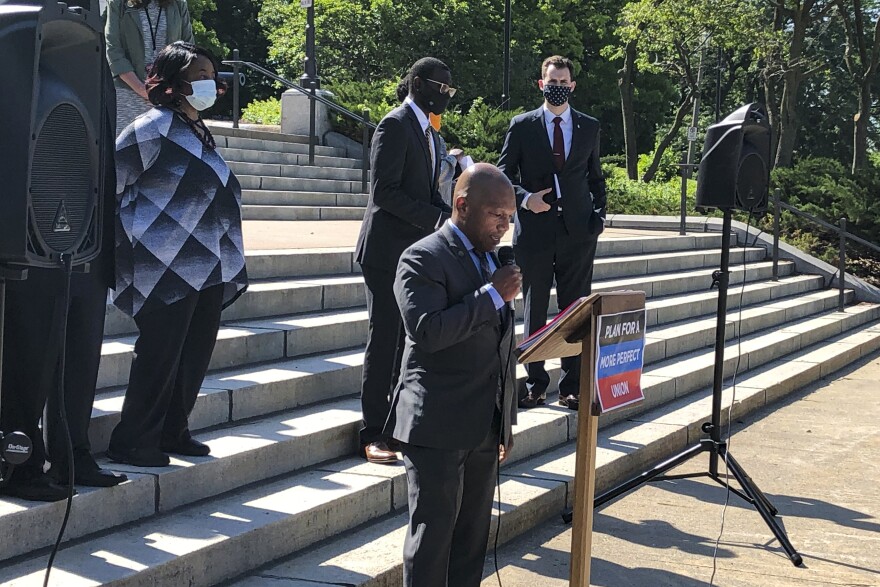The threats made against Iowa Democratic Party Chair Ross Wilburn come as school board members and local election officials across the country are also being targeted. One political scientist says the threats may be related to an increase in inflammatory political rhetoric.
Law enforcement officers are investigating multiple racist threats against Wilburn after he wrote an opinion piece criticizing former President Donald Trump in the Des Moines Register, published ahead of his rally at the Iowa State Fairgrounds on Oct. 9. One of the messages to Wilburn, the state party’s first Black chair, specifically referenced lynching.
Speaking to reporters Thursday, Wilburn said that as a person of color he’s experienced discrimination for decades, long before he was elected to the Iowa House or chosen to lead the state party. But he says he has seen a marked increase in vitriol since Trump has risen to the national stage.
“It’s just within the past few years since former President Trump has really stoked the fuels of hate and hatred,” Wilburn told reporters Thursday. “And again, it’s spilling over to people wanting to run for these school boards and city councils. And part of my main message for coming forward is we can’t have people be bystanders. We have to say, ‘this is not acceptable in our communities’.”
Penn State political scientist Jim Piazza researches the relationship between politicians’ hateful speech and domestic terrorism in the U.S. and around the world. He says there’s a correlation between the two.
“My research generally finds a pretty strong relationship not only in the United States but across, nationally, in the world, over time between politicians’ speech, the rhetoric they use, the type of language they use, and whether or not they use hate speech to try and denigrate other social groups and so on, and terrorism,” Piazza said. “It’s a pretty strong and robust and consistent relationship.”
Piazza says hateful rhetoric isn’t just bluster: when politicians use inflammatory speech to dehumanize individuals based on their racial, ethnic or religious identity or demonize their political adversaries, it deepens civic divides and makes their countries more vulnerable to political violence, especially polarized societies like the U.S.
“The essential finding is, is that in countries where it is more commonplace for politicians to use hateful speech, there just was a higher incidence of domestic terrorist activity in those countries.”
Researchers at the Center for Strategic & International Studies have written about the “escalating” problem of domestic terrorism in the U.S. in recent years. In a report published in 2020, the think tank argued that “the most significant threat” likely comes from white supremacists and right-wing extremists, noting that the total number of attacks and plots “has grown significantly in the past six years."
According to the FBI, the number of hate crimes reported in 2020 was the highest in more than a decade, with a notable increase in incidents perpetrated against Asian people.
“The sudden increase in reported hate crimes against Asian people was attributed in part to the scapegoating of the Asian community for the emergence of COVID-19, which originated in China and which former President Donald Trump called the "Chinese virus”, NPR reported.
While elected officials across the political spectrum use what Piazza described as “fighting words." he said there is a significant difference in the language Trump uses to assail the country’s systems of government.
“There is a qualitative difference between using disparaging speech that also denigrates the political process, and trust in democratic political institutions, and disregards…or the willingness to break norms of behavior in the United States that are important to political order, right? Versus riling up your supporters through fighting words,” Piazza said.
Piazza notes that leaders around the world have a long and dark history of using hateful rhetoric to “unify and mobilize supporters” and “delegitimize and dehumanize political opponents."
“I feel like we're in a political moment where there's not necessarily disincentives to that kind of behavior and that kind of rhetoric,” Piazza said. “That is the danger of our political moment.”
Trump’s rhetoric has not stopped the state’s top Republicans from standing alongside him, as some did at his rally in Des Moines on Oct. 9, including Gov. Kim Reynolds and U.S. Sen. Chuck Grassley. Both issued statements condemning the threats against Wilburn, as have a slate of Iowa’s Republican leaders. Still, at the rally at the Iowa Fairgrounds, Grassley welcomed Trump’s endorsement.
“I was born at night, but not last night, so if I didn’t accept the endorsement of a person that’s got 91 percent of Republican voters in Iowa, I wouldn’t be that smart,” Grassley said. “I’m smart enough to accept that endorsement.”






